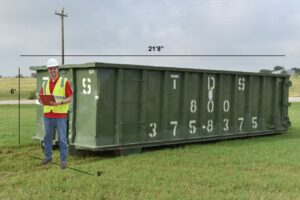When embarking on a major home renovation, a cleanout project, or any other project that generates large amounts of waste, renting a dumpster can be a great solution. However, the process of choosing the right dumpster, understanding the costs, and knowing what to do with it can be overwhelming. This guide will provide you with all the essential information you need to make an informed decision and ensure a smooth dumpster rental experience.
What is Dumpster Rental?
 Dumpster rental is a service provided by waste management companies where you can rent a dumpster for a specified period of time to dispose of large quantities of waste. Whether you’re cleaning out a basement, renovating a kitchen, or clearing out a yard, renting a dumpster can help you keep your work area organized and free from debris.
Dumpster rental is a service provided by waste management companies where you can rent a dumpster for a specified period of time to dispose of large quantities of waste. Whether you’re cleaning out a basement, renovating a kitchen, or clearing out a yard, renting a dumpster can help you keep your work area organized and free from debris.
These dumpsters come in various sizes, from small 10-yard bins to large 40-yard containers, so you can choose one based on the amount of waste you expect to generate. The rental period typically ranges from a few days to a week, with the option to extend if needed.
How to Choose the Right Dumpster Size
Choosing the correct dumpster size is one of the most crucial steps in the rental process. Choosing a bin that’s too small will require multiple trips or overloading the dumpster, while selecting one that’s too large may result in unnecessary costs.
Generally, dumpsters are sized in cubic yards, and each size is suited to a particular project. A 10-yard dumpster is perfect for small cleanouts or minor renovations, while a 20-yard dumpster is ideal for larger home projects. If you are tackling a major construction or commercial cleanup, a 30-yard or 40-yard dumpster might be necessary.
To help determine the right size, it’s important to consider the scope of your project. For instance, if you’re cleaning out a small garage or attic, a 10-yard dumpster should suffice. On the other hand, a 20-yard dumpster will typically accommodate the debris from a kitchen remodel or large basement cleanup.
The Cost of Dumpster Rental
The cost of renting a dumpster can vary depending on several factors, including the size of the container, the duration of the rental, and the location of the rental. On average, dumpster rental prices range from $200 to $500, with the most common options being 10-yard, 20-yard, and 30-yard dumpsters.
In addition to the rental fee, other factors can influence the overall cost. Some companies may charge extra for exceeding the weight limit, while others may offer a flat rate that includes a specific weight allowance. Be sure to ask about any additional fees, such as disposal fees, delivery charges, or late fees, before finalizing your rental agreement.
Understanding Dumpster Rental Terms and Conditions
Before renting a dumpster, it’s essential to familiarize yourself with the terms and conditions of the rental. Waste management companies usually have specific rules about what can and cannot be disposed of in the dumpster.
For example, hazardous materials such as chemicals, paint, asbestos, or electronic waste are typically prohibited in dumpsters. Be sure to clarify what items are allowed before you begin loading your waste, as violating these terms could result in penalties or fines.
Another important consideration is the rental period. Many dumpster rental companies provide a 7-day rental period, but it’s important to confirm this and check whether additional days will incur extra charges. Additionally, the delivery and pickup times should be confirmed to ensure that the service fits your schedule.
The Dumpster Delivery and Pickup Process
 Once you’ve chosen your dumpster size and signed the rental agreement, the next step is arranging for delivery and pickup. Most companies will schedule a delivery time based on your availability, so you can have the dumpster placed where it’s most convenient for your project.
Once you’ve chosen your dumpster size and signed the rental agreement, the next step is arranging for delivery and pickup. Most companies will schedule a delivery time based on your availability, so you can have the dumpster placed where it’s most convenient for your project.
When the dumpster is delivered, make sure there is adequate space for the truck to access the location and drop it off. For larger dumpsters, you may need to clear a driveway or parking area. If the dumpster is going on the street, some areas may require a permit, which can be arranged through your rental company.
When your project is completed or when you’ve filled the dumpster, simply call the rental company to schedule a pickup. Ensure that the dumpster is accessible and that it’s not overloaded beyond the weight limit or the rim.
Tips for Using a Dumpster Efficiently
Using a dumpster efficiently can save you both time and money. To maximize space and minimize the risk of extra charges, follow these helpful tips:
Break down large items: Disassembling large furniture or breaking down construction debris like drywall or wood can help you fit more into the dumpster.
Don’t overfill the dumpster: Make sure the contents are level with the top of the dumpster, as overloading can lead to additional charges or make it difficult for the rental company to pick up the dumpster safely.
Separate recyclable materials: If possible, separate recyclables like cardboard, paper, and certain plastics from your regular trash. This can reduce the amount of waste going into the dumpster and may be a requirement for some rental companies.
Plan your loading: Place heavier items at the bottom of the dumpster to avoid crushing lighter items. This helps in distributing the weight evenly and preventing the dumpster from becoming too heavy.
